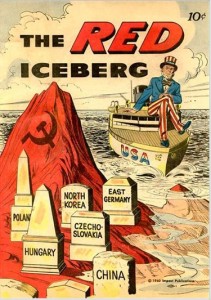As we briefly touched upon in the discussion of this film, “The Grapes of Wrath” can be symbolically used as a criticism of the capitalist system during the 1930s, specifically the proletariat being exploited by the system. Critics labeled the film “socialist” or “Marxist”, and farming unions and government agencies alike condemned it.

Clell Pruett burns a copy of The Grapes Of Wrath as Bill Camp and another leader of the Associated Farmers stand by. “One member of the county board of supervisors denounced the book as a ‘libel and lie.’
Despite critics in the United States giving the film a Red label, it received a different criticism from a country that no one could question fit all of those same labels: the Soviet Union. In 1948, Joseph Stalin allowed theaters in the Soviet Union to show “The Grapes of Wrath” for reasons that we can assume to be anti-capitalism propaganda, showing destitution that the Okies endured in the face of an oppressive capitalist system (Whitfield). Just a few short years after these two countries were allied in the Second World War, now propaganda attacks against each other were the norm and tensions were rising.
This screening of “The Grapes of Wrath” in the Soviet Union, however, did not land the way that Stalin anticipated. Rather than stir up anti-capitalist emotions, the Soviets that viewed “The Road to Wrath”, as it was titled in the U.S.S.R, were in complete awe that even the poorest of the poor in the United States were able to save their money and afford an automobile. As the wrong message continued to spread, Stalin decided to pull the film from theaters after a few short weeks (Whitfield). In this sense, “The Grapes of Wrath” aptly foreshadowed not only the Cold War itself but the outcome and the reasons behind it. The definition of the term “poor” in the two countries was vastly different, and the enormous economic gap between the capitalist system of the United States and the centrally planned economy of the Soviet Union was clear. There is a particularly funny quote from the text that I discovered, regarding the poor central planning of the Soviet economy: “Ineptitude and inefficiency permeated the command economy he (Stalin) established—so much so that, had the Kremlin ever gained control of the Sahara, Western analysts liked to quip, there would soon have been a shortage of sand.”
I thought that this anecdote about the “The Grapes of Wrath” was a very interesting insight into the future of our country, much more than Ford ever planned or anticipated, and added an extra layer to an already complex tale.
Sources:
http://lisa.revues.org/802?lang=en#ftn2
http://www.pbs.org/wnet/need-to-know/culture/slideshow-steinbecks-salinas-valley/16441/#3

